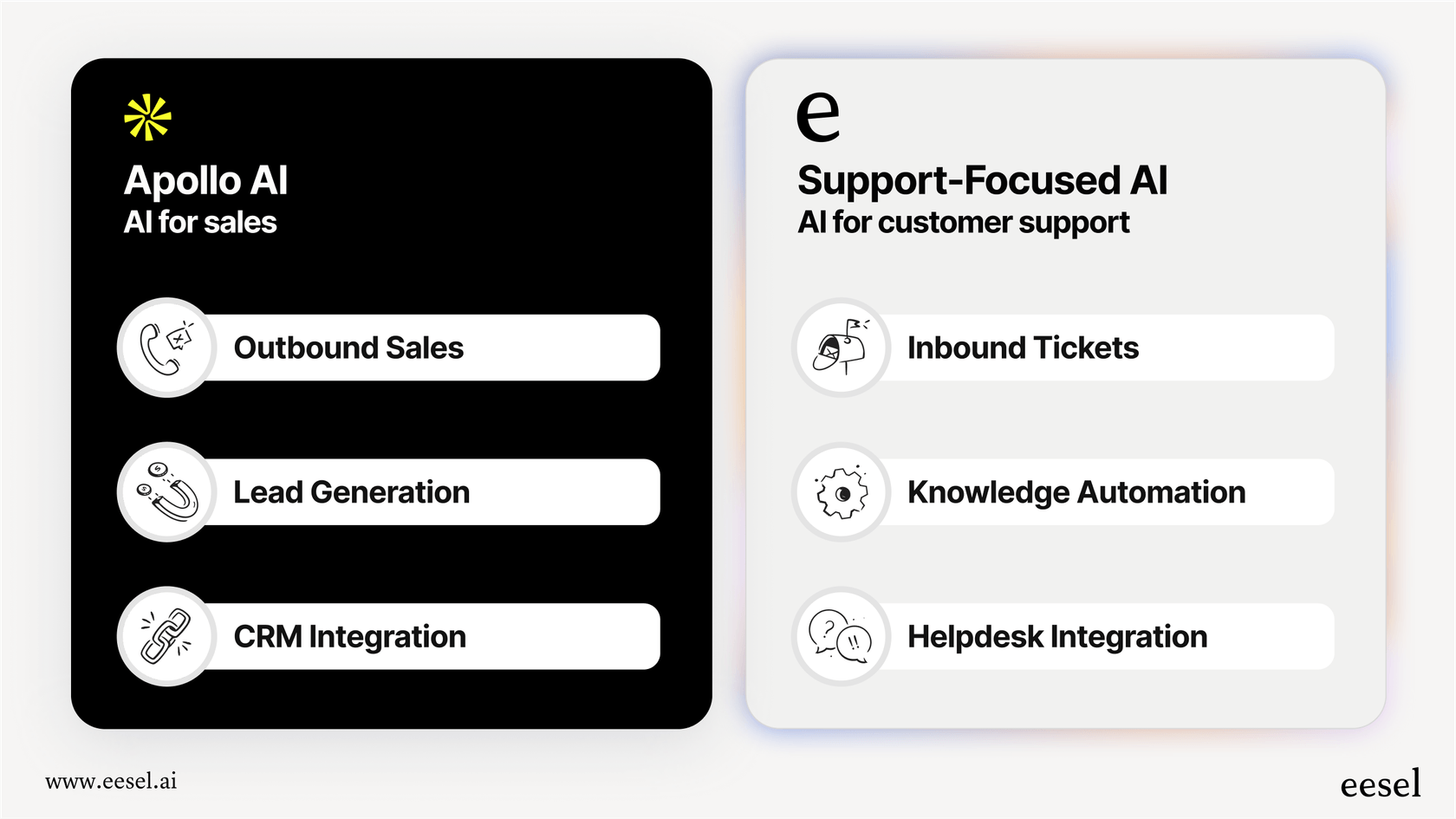
If you're in the world of sales, you've probably heard of Apollo.io. It’s one of the heavy hitters in sales intelligence, a go-to platform for outbound teams needing data and tools to connect with potential customers. But with all the "AI" hype, it can be tough to figure out what it really does, who it’s for, and, more importantly, where it falls short.
This guide is an honest, no-fluff overview of Apollo AI. We'll dig into its core features, check out the pricing, and talk about its biggest limitations. By the end, you'll have a clear idea of whether it’s the right tool for your team or if you should be looking at something built for a totally different ballgame, like customer support and internal knowledge.
What is Apollo AI?
Let's clear one thing up right away: Apollo AI isn't a separate product you can just go out and buy. It's the name for all the artificial intelligence features baked into the main Apollo.io platform. You can think of it as the smarts powering their outbound sales engine.
At its heart, the platform is all about making B2B sales less of a headache. It pulls together a massive contact database (we're talking over 210 million contacts and 35 million companies) with a whole suite of tools for finding prospects, engaging with them, and tracking what works.
The goal is to give sales teams everything they need in one spot. With Apollo AI, you can pinpoint the right people to talk to, get a little help from AI to write personalized messages, and put your outreach campaigns on autopilot. It all comes down to booking more meetings and closing deals faster. It’s built from the ground up as an all-in-one toolkit for go-to-market teams.
Learn how to use Apollo.io in 2025 with this full step-by-step tutorial.
Breaking down the key Apollo AI features
Apollo crams a lot of tools into its platform. Let's take a look at the main features to see how they fit together.
An enormous lead database and smart prospecting
It all starts with the data. The platform gives you access to a huge B2B database, which is the foundation of any good outbound campaign.
But a giant pile of data is useless if you can't find what you need. Apollo’s real magic is in its advanced search filters. You can slice and dice the database to find incredibly specific leads based on things like job title, industry, company size, and even signals that suggest they might be ready to buy. This means you can build laser-focused lists of people who are actually likely to care about what you’re selling, instead of just shouting into the void.

AI-assisted sales engagement and automation
Once you’ve got your list, Apollo AI helps you reach out without sounding like a robot. The AI Writing Assistant is a nice touch for drafting personalized emails, punchy subject lines, and custom opening sentences. It’s not going to write a flawless email for you every single time, but it's a great way to get past that initial writer's block.
The real time-saver is the "Sequences" feature. This is where you can build automated, multi-step outreach campaigns that mix emails, calls, and LinkedIn tasks. For instance, you could set up a sequence that sends an initial email, follows up three days later if you don’t get a reply, and then reminds you to connect on LinkedIn. The platform also shows you analytics like open and reply rates, so you can see what’s working and what’s not.

Data enrichment and CRM integration
To keep you working with the freshest information, Apollo is constantly updating its contact and company data in real-time. This data enrichment leads to fewer bounced emails and more accurate details you can use for personalization.
The platform also syncs up with major CRMs like Salesforce and HubSpot. This is a big deal for keeping all your sales activities and data organized in one place. But here’s the catch: while this is fantastic for your sales data, it does absolutely nothing for your support teams. They live in a completely different world of tools like Zendesk, wikis like Confluence, and chat apps like Slack. This is a problem that specialized platforms like eesel AI were built to solve by connecting all those scattered knowledge sources into one cohesive brain.

Apollo AI pricing and plans
Apollo has a few different pricing tiers for teams of different sizes and with different needs. The plans mostly revolve around which features you get and how many "credits" you have to spend on things like revealing mobile numbers or exporting data.
Here’s a quick look at their plans:
| Feature | Free | Basic Plan | Professional Plan | Organization Plan |
|---|---|---|---|---|
| Price (per user/mo) | $0 | $49 | $79 | $119 |
| Unlimited Email Credits | Yes | Yes | Yes | Yes |
| Export Credits (per year) | 120 | 12,000 | 24,000 | 48,000 |
| Sequences | 2 | 2 | Unlimited | Unlimited |
| AI Research Intelligence | No | No | Yes | Yes |
| Dialer | No | No | US Only | US & International |
| Custom Reports | No | No | Yes | Yes |
The Free plan is a good way to test the waters, but you'll bump into the limits pretty fast. To really unlock the AI features and get enough credits to be useful, you’ll have to move to a paid plan. For most teams, the Professional plan is the sweet spot since it gives you unlimited sequences and some of the more advanced AI tools.
One thing to watch out for is the credit system. While it seems flexible, it can also make your costs a bit unpredictable. If your team has a big month of prospecting, you could easily burn through your credits and face an unexpected bill. This is a different approach from platforms that offer more straightforward pricing. For example, eesel AI has transparent plans that don’t bill you per resolution or interaction, so you know exactly what you’re paying each month.
The big limitations of Apollo AI
Apollo is a beast of a tool, but it’s not a magic wand. It was built for a very specific job, and if your needs don't line up with that, you’re going to feel it.
Apollo AI is for outbound sales, not customer support
This is probably the most important thing to get straight. Apollo AI is a sales tool, through and through. Its entire design, the features, the workflows, the data, is all about finding new leads and starting conversations. It simply wasn't built to manage incoming customer support tickets, handle IT requests, or serve as an internal knowledge base.
Once a lead becomes a paying customer, their journey shifts to a totally different set of tools. If they run into a problem, they aren't emailing your sales rep; they're logging a ticket in Zendesk or Freshdesk. Apollo has no role to play there. This is exactly where a tool like eesel AI for customer service shines, plugging directly into your helpdesk to handle frontline support and help agents draft replies.

The Apollo AI setup can get complicated
As many users have found, Apollo isn't something you can just pick up and master over lunch, especially if you're not already a sales pro. To really get your money's worth, you need to have a good handle on sales operations, lead nurturing, and how to structure effective outreach campaigns.
This is a world away from the super simple, self-serve approach of a platform like eesel AI. With eesel AI, you can connect your helpdesk and knowledge sources in a few clicks and be up and running in minutes. There are no mandatory demos or long-winded sales calls just to try the product. You can sign up, set it up, and launch it all on your own time.
How do you guys use apollo.io? what is useful?User discussion on the complexity of setting up Apollo AI. ### Apollo AI doesn't have great simulation or gradual rollout features
byu/OkEye414 inLeadGeneration
Sending out a ton of automated emails can be risky. One bad sequence configuration and you could be blasting out confusing or off-brand messages, which can do some real damage to your reputation. While Apollo gives you analytics after the fact, it doesn't offer a proper sandbox where you can test how its AI will behave before you let it loose.
For support teams, where getting the accuracy and tone right is everything, this is a deal-breaker. That's why eesel AI includes a powerful simulation mode. It lets you test your AI agent on thousands of your actual past support tickets, completely risk-free. You can see exactly how it would have answered, get solid forecasts on resolution rates, and then roll out automation slowly, one topic at a time. This ability to test things safely is a huge difference-maker.

Apollo AI is a tool for one department, not a unified knowledge platform
Apollo does a great job of keeping sales data in one place. But these days, company knowledge is scattered all over. A support agent trying to solve a customer issue might need to pull info from an engineering wiki in Confluence, a marketing doc in Google Docs, and solutions from old support tickets.
Apollo can't connect those dots. It creates a data silo for the sales team. A true knowledge automation platform like eesel AI is designed to bring all those sources together instantly. It learns from your past tickets, help center articles, and internal wikis to build a single, reliable brain for your entire support operation.
The verdict: Is Apollo AI right for your team?
So, what’s the final word? It really just depends on what problem you're trying to solve.
Apollo AI is an excellent, top-of-the-line choice for B2B sales teams, sales development reps (SDRs), and marketers focused on lead generation and outbound campaigns.
However, it is the wrong tool for customer support teams, IT service desks, or any company looking to automate how they resolve inbound tickets or build a central knowledge hub for everyone to use.
Here’s a simple way to think about it:
| Use Case | Apollo AI | eesel AI |
|---|---|---|
| Primary Goal | Outbound Sales & Lead Generation | Inbound Support & Knowledge Automation |
| Core User | Sales Development Rep (SDR) | Support Agent / IT Specialist |
| Integrates With | CRMs (Salesforce, HubSpot) | Help Desks (Zendesk, [REDACTED]), Wikis (Confluence, Notion), Chat (Slack) |
| Key Strength | B2B Contact Database | AI trained on your specific, unified knowledge |
| Setup Time | Days to Weeks (requires expertise) | Minutes (radically self-serve) |
A better choice for support and internal knowledge
Apollo AI is fantastic at what it does, but it leaves support and IT teams facing a completely different set of challenges. They need a solution that fits their workflows, connects to their tools, and understands the fine art of solving customer problems, not just finding new leads.
For those teams, eesel AI is the purpose-built answer. It's designed from the ground up to automate support, give agents superpowers, and bring all your company knowledge together without making you switch tools.
- Go live in minutes, not months: It’s a truly self-serve platform you can set up yourself.
- Unify all your knowledge: It connects to your helpdesks, wikis, and chat tools instantly.
- Test with confidence: You can use the powerful simulation mode to roll out automation risk-free.
- Total control: You can customize exactly which tickets the AI handles and how it responds.
Ready to see how AI can actually help your support workflows, without the complexity of a sales-first tool? Start your free eesel AI trial today or book a demo to learn more.
Frequently asked questions
Apollo AI isn't a separate product you can purchase. It's the name for all the AI-powered features that are already built into the main Apollo.io sales platform to help with tasks like prospecting and email writing.
No, Apollo AI is not designed for customer support. It is built specifically for outbound sales activities like finding new leads and automating outreach, not for managing inbound customer service requests.
Your reps would primarily use its features to find ideal customer profiles in the contact database, get AI assistance with writing personalized outreach emails, and automate multi-step engagement sequences to connect with prospects.
Basic AI features are included in most plans, but the more advanced capabilities, like AI Research Intelligence for deeper prospect insights, are reserved for the higher-tier Professional and Organization plans.
No, it does not. Apollo AI focuses on integrating with sales-centric tools like CRMs (e.g., Salesforce, HubSpot) and is not designed to connect with or pull information from internal wikis or broader knowledge management systems.
Share this post

Article by
Stevia Putri
Stevia Putri is a marketing generalist at eesel AI, where she helps turn powerful AI tools into stories that resonate. She’s driven by curiosity, clarity, and the human side of technology.






